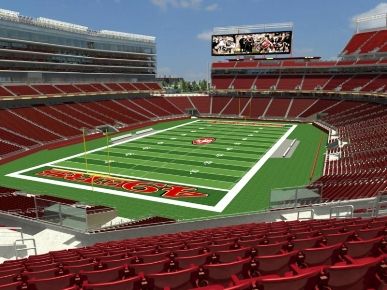Will 49ers stadium be last one subsidized in CA?
The San Diego Chargers’ and Oakland Raiders’ announcement that they had taken steps toward jointly building a privately financed $1.7 billion stadium in Carson may have been done at least partly with the intent of persuading their home cities to push for taxpayer subsidies to allow each team to remain in place with their own new stadiums.
 But the fact that the teams see no trouble in coming up with $850 million apiece seems likely to make San Diego and Oakland voters more opposed to subsidizing billionaire team owners than ever. So does the fact that Walton family member Stan Kroenke, who owns the eager-to-move St. Louis Rams, is preparing to build a $1 billion-plus stadium of his own in Inglewood without public dollars — and with the blessing of city officials who are putting the project on a fast track, bypassing environmental laws.
But the fact that the teams see no trouble in coming up with $850 million apiece seems likely to make San Diego and Oakland voters more opposed to subsidizing billionaire team owners than ever. So does the fact that Walton family member Stan Kroenke, who owns the eager-to-move St. Louis Rams, is preparing to build a $1 billion-plus stadium of his own in Inglewood without public dollars — and with the blessing of city officials who are putting the project on a fast track, bypassing environmental laws.
The deal accepted by Santa Clara County voters in 2010 limiting the subsidies for the 49ers’ new $1.2 billion Levi’s Stadium seemed a good deal at the time; the highest estimate of direct subsidies for the project CalWatchdog.com could find is $156 million. After what’s happened in recent years, that deal doesn’t look so good anymore.
Live sports are gold for TV networks
That’s because the economics of sports have changed since the 49ers’ deal was negotiated. Whether they move or not, the Chargers and Raiders have much less to back up their argument that they would face a “competitive disadvantage” by going without the subsidies that pro teams have traditionally demanded for new stadiums and arenas. They understand that franchise ownership is more beneficial than ever in an era in which live sports are the most consistent way to build a big real-time audience on TV and online.
For the 2014 season, TV networks paid more than $5.5 billion to the NFL. After some league and player pension expenses are paid, the rest of the TV money and other revenue is divvied up among the 32 teams. The $188 million each team got in 2014 was up at least 20 percent from 2013. Teams are likely to get even more money in coming years. In October, when DirecTV renewed its contract with the NFL, it increased its annual payment from $1 billion to $1.5 billion.
The National Basketball Association and Major League Baseball are enjoying similar huge gains in TV rights payments. Teams in those sports benefit both from national TV fees and local deals with cable companies.
Cable TV bills swell due to sports fees
This double revenue stream explains why the Dodgers sold for a record $2.15 billion in 2012 and the Clippers sold for a record $2 billion in 2014.
Only franchises in the New York City metropolitan area are likely to do better than the 20-year, $3 billion deal the Lakers struck with Time Warner Cable in 2011 to build two regional cable TV networks around the team; and the 25-year, $8.5 billion deal the Dodgers signed with Time Warner in 2013 to set up a dedicated cable channel built on the team’s preseason and regular-season games.
These TV costs, of course, are passed along to consumers via sky-high cable TV bills — something Californians already complain about. When residents put two and two together and realize that pro sports are already hitting their pocketbooks in their cable bills, they may be even less enthusiastic about conveying money to billionaire team owners to help build stadiums.
For these reasons and more, Levi’s Stadium could be the last publicly subsidized pro sports stadium in California.
Chris Reed
Chris Reed is a regular contributor to Cal Watchdog. Reed is an editorial writer for U-T San Diego. Before joining the U-T in July 2005, he was the opinion-page columns editor and wrote the featured weekly Unspin column for The Orange County Register. Reed was on the national board of the Association of Opinion Page Editors from 2003-2005. From 2000 to 2005, Reed made more than 100 appearances as a featured news analyst on Los Angeles-area National Public Radio affiliate KPCC-FM. From 1990 to 1998, Reed was an editor, metro columnist and film critic at the Inland Valley Daily Bulletin in Ontario. Reed has a political science degree from the University of Hawaii (Hilo campus), where he edited the student newspaper, the Vulcan News, his senior year. He is on Twitter: @chrisreed99.
Related Articles
San Diego's pension reform model finally inspires copy-cats
In early 2012, when then-San Diego Councilman Carl DeMaio was pushing an innovative, unusual, unprecedented pension reform initiative in California's
Sacramento Mayor's New Wheels
Katy Grimes: Sacramento Mayor Kevin Johnson has a fancy new set of wheels. So what? Sacramento is laboring under a
Facts cloud CA global warming alarmism
April 10, 2013 By Warren Duffy If you are looking for employment where you can be mistaken time and time




